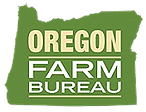Oregon Farm Bureau (OFB) would like to address recent concerns and information in circulation regarding the alleged shutdown of small family farms in Oregon. The agency actions in question related to confined animal feeding operations (CAFO) and groundwater usage. As a result, these examples and stories need some context. Our position is that all agriculture in Oregon is over-regulated and all farmers, regardless of size, deserve the ability to operate in a reasonable and fair manner with limited government interference.
To suggest that the State of Oregon is targeting small, or “backyard” farms is a stretch.
Confined Animal Feeding Operations
All farm operations in Oregon, including small livestock enterprises, may be subject to regulation by the Oregon Department of Agriculture (ODA). There is nothing new about that. We believe ODA’s intent was to provide information and serve as a resource to those operators who previously hadn’t had to worry about water quality or other livestock run-off related issues. However, after much confusion and after receiving feedback from many organizations and small livestock operators, ODA recently announced they would be reviewing their plan to enforce the policy that milking an animal in a barn, or the washing of equipment used in milking an animal, triggers a CAFO permit coverage requirement. If ODA had moved forward, many small farm operators involved in livestock production may have been required to obtain a CAFO permit. At this time, that will no longer be necessary. It is important to note that if livestock are present, even if a CAFO permit is not required, ODA’s Agricultural Water Quality program rules still apply. Both a CAFO permit and ODA’s Agricultural Water Quality program are intended to ensure water quality standards are being met on all of Oregon’s agricultural operations.
Groundwater Regulation
There have also been allegations that small farms are being targeted by the Oregon Water Resource Department (OWRD) or by Oregon’s water laws. It is true that in Oregon, all water technically belongs to the public, but individuals may apply to the OWRD for a permit to legally use water. Certain types of uses are “exempt” from needing a permit, one of those uses, specifically the one highlighted by OPB*, is the exempt domestic well. An exempt domestic well allows for a landowner to drill a well and use up to 15,000 gallons of water per day for domestic purposes. A domestic well may be used to irrigate up to “one-half acre of non-commercial gardens.” If a landowner chooses to irrigate more than one-half acre or irrigate crops for commercial purposes, they must get a water right permit for either available surface water or groundwater. This is not new.
Legitimate farming operations have water rights and do not use exempt wells or other sources to irrigate their commercial crops. Oregon has long standing water laws based on the prior appropriations doctrine. Regardless of size, there is a process that all agriculture producers must go through to use water. Small farms aren’t, and should not, be treated any differently than any other farm. OFB has not, nor ever will, support the illegal use of water. For example, OFB has been very vocal about the illegal use of water with the proliferation of hemp and marijuana grows. We support an individual’s ability to raise a crop, but they don’t get to short circuit the process. OFB represents many types of legally permitted water right holders and we support Oregon’s water rights system.
Oregon’s farmers and ranchers are committed to employing best management practices to efficiently use Oregon’s water and to mitigate any potential adverse effects on the sustainability of Oregon’s water resources. As an organization dedicated to supporting and advocating for agriculture, including small, medium, and large family farms, OFB understands the vital role farmers and ranchers play in our communities and food system. These farms and ranches are the backbone of our agricultural heritage, and OFB is committed to ensuring their continued success and sustainability. We do not believe ODA and OWRD are singling out small family farms, but that doesn’t mean that agriculture as an industry is not under attack. Oregon heavily regulates its agriculture industry, to the point that many operations cannot remain viable. The solution is regulatory reform for agriculture. The idea that small farms are somehow better than other sized farms and should be exempt from following the rules solves nothing. All sizes of family farms, whether small or large, need one another to survive. Oregon Farm Bureau will continue to advocate for a level playing field for all. We stand in support of initiatives aimed at promoting the viability and resilience of family-owned farms, recognizing their significance in fostering rural economies and preserving agricultural diversity. We encourage anyone with concerns about the viability of small family farms to reach out to OFB or other reputable agricultural organizations for accurate information and support. Together, we can continue to champion the invaluable contributions of all family farms to our communities and food system.
For more information, please contact OFB’s Government Affairs team.


Comments